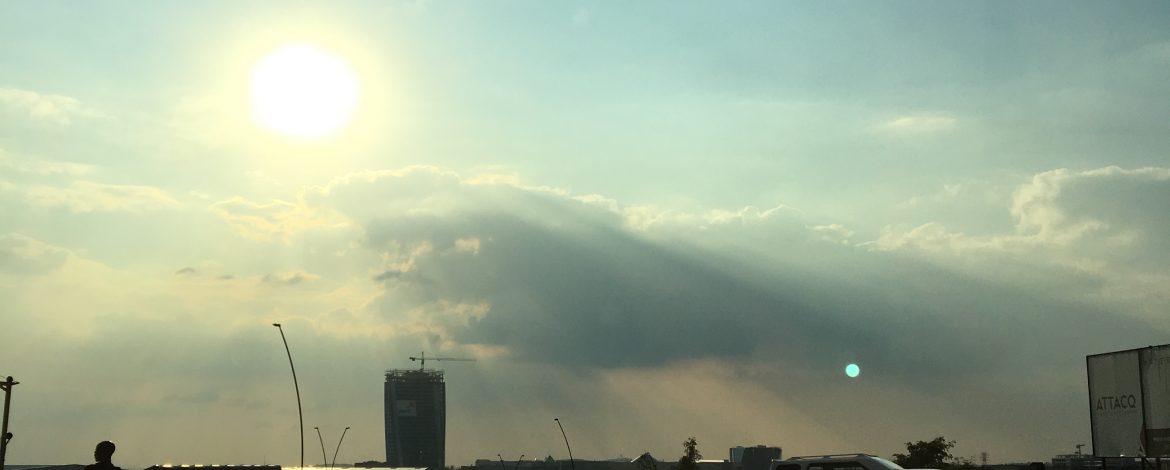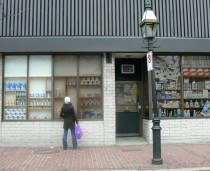Once upon a time, I worked to get a brand new environmental non-profit off the ground. Our name was Rock ‘n Renew, and we used musicians and bands to highlight climate change and what could be done to help, mostly to an audience of young people and students. I believed the climate science was clear: the earth was warming at unprecedented rates and this would have major detrimental effects on our environment as time progressed.
Fast forward a decade and it doesn’t seem much has changed. Mileage standards for cars were raised, but there hasn’t exactly been an explosion of solar panels or people using trash to fuel their cars. (Yes, I watched Back to the Future too many times as a child.)
Most people I know still heat and cool their homes with gas or coal-fired electricity. Waste is produced in massive quantities by industry and consumers. Americans eat tons of meat, which requires an enormous amount of energy and water to produce, and the world is increasingly joining them.
A decade ago, I felt like I was shouting into the wind most of the time. Individuals could do small things like switch to CFL lightbulbs or take reusable bags to the grocery store or ditch plastic water bottles, but it felt like the tiniest of dents in an enormous pile of rubbish.
I also found the strange divide between liberals and conservatives on the issue of climate change to be confounding. I didn’t understand how something that affected the physical condition of the planet was a political issue. To be fair, I found many people within the evangelical community in which I was raised who agreed with me on the importance of conserving natural resources, and I enjoyed an excellent book on the subject by Matthew Sleeth on how responsible stewardship of the earth should be a priority for Christians.
But eventually, to be honest, I kind of gave up. Youth were engaged but most adults weren’t listening, and even if they were, it was industry that would have to change on a massive scale, with corporations moving towards renewable energy and serious conservation efforts, which felt impossible without either government or consumers forcing them. I moved into international development instead, hoping to help people in a more immediate way in countries less privileged than ours.
The truth is that the problems of climate change are hard for many Americans to get really motivated about and I understand why. Even as we keep passing alarming climate milestones–the amount of carbon dioxide in the atmosphere, ice shelf melting, glaciers disappearing–these changes aren’t felt in a real way for most Americans. Other than the crazy hot weekend in January or an erratic snowstorm or news reports of natural disasters that hit a few states or cities, most Americans are not feeling the effects of the warming planet in a real way yet. It’s easier to get more excited about alleged Russian intervention in the election or the new season of House of Cards or covfefe.
To that I would say, come visit me overseas.
I just finished living through four years of drought in Botswana, its worst in 30 years. I am a coddled expat in a house with a pool and air conditioning, but it was still no picnic to have the water cut off 3-4 days a week because the city dam was empty. No running water means timing your meals and showers carefully, filling up buckets to flush the toilet, and having no way to bathe either your children or yourself when both of them vomit all over you in the space of three minutes due to stomach flu (sadly I am speaking from experience here). Much more critically, cattle starved without grass to eat and babies in Botswana died of diarrhea due to lack of clean water.
Yes, there was drought before, but now it is more intense, more frequent, and it lasts longer. Yes, there has been famine before, but now agriculture failure is more common, and techniques that have worked for farmers for generations aren’t working anymore.
Before Botswana, I lived in Pakistan for two years. There wasn’t enough electricity to power the country, even though the bright sun beat down 360 days a year. Without solar infrastructure to take advantage of it, this sunshine only made you sweat harder during the eight to ten hours a day without fans when “load-shedding” would turn off everything in town not powered by generator, plunging shops into darkness and grinding manufacturing to a halt.
My friend Kathrine who has been posted to China twice in her foreign service career regularly posts photos of Guangzhou on days with especially bad air quality. On those days, which seem frequent, outdoor activity is not recommended in the afternoons and people with asthma are advised to keep their quick relief medication handy. The skyline is shrouded in a thick gray haze.
For the developing world, climate change isn’t the future: it is now. Power supply issues, lack of clean water, and pollution crises aren’t theoretical predictions or concerns; they are here today. Many people in the developing world also don’t have access to those things that will insulate most Americans even as the environment gets more hostile, erratic, and potentially polluted from here on out: climate-controlled houses, cheap food staples in massive quantities, air filters, asthma inhalers, government relief agencies, and filtered municipal water piped directly into homes.
It is hard to take urgent action when a problem still seems far away or not certain, when life proceeds generally as usual even with climate scientists screaming for the last three decades that the situation is dire.
So the U.S. has backed out of the Paris Agreement. Maybe this is the wake-up call we needed. Maybe instead of giving up, it’s time to double down, take up individual actions even if they feel like a drop in the bucket and start lobbying hard for corporate actions that can turn that drip into a gush.
We can’t wait for governments, or faceless climate change committees or corporate responsibility departments to take the lead on cleaning up our environment and taking the threat of a warming planet seriously. As of today, it is up to each one of us now, and that’s not necessarily a bad thing.
The best news I’ve seen this week is about the mayors, governors, and other leaders at state and municipal levels who have banded together to fight climate change in a serious way and follow the Paris Agreement anyway. This is the kind of action I was looking for more than a decade ago, when I despaired at the fact that giving college kids canvas tote bags didn’t have any impact on college administrations investing millions of dollars in dirty coal and fossil fuels. When advising kids to “take the bus” or grow some of their own food didn’t mean much when the nation’s army of trucks was transporting agricultural products across the country while belching out tons of carbon dioxide in the process. When you could buy unbleached recycled toilet paper but the construction site next door could toss fifteen tons’ worth of waste and trash without fine or consequence.
Businesses are slowly starting to realize that climate protection is good for them too. Perhaps that is because it is hard to make money in a chaotic world, or because they are scared by the efforts of the world’s emerging powerhouse, China, to make renewable the new trend and they don’t want to be left behind. State and city leaders are right that many environmental decisions are made there instead of at the federal level, and that they can make a huge difference. Whatever the case, it feels today, ironically, like we are all in this together more than ever, and it is wonderful to see.
To celebrate, here are three small things I am committing to do as a result of my decision:
1. Recycle. In America, where city trucks come right to your doorstep to pick up those blue bins, recycling barely qualifies as being environmentally-friendly. But in Botswana, trash that gets picked up (assuming it does), all goes right to the dump. I’ve heard a rumor that it is still possible to recycle plastic, cardboard, and glass by dropping them off somewhere, so I’m going to find out how and make it happen.
2. Stop using plastic water bottles. I know: I really am acting like it’s 2005 here. I’m sure all of you ditched the plastic long ago and are onto sleek stainless steel varieties with artful hemp designs on the side. I was there too for awhile, but then I moved overseas where plastic water bottles still litter every conference room and water coolers are scarce. Nonetheless, it’s time to work harder at this.
3. Scale back on meat. Beef is cheaper than wheat in Botswana and the easiest Tuesday night dinner I know is to throw an entire beef tenderloin on the grill (it only costs $10). But it’s still a bad deal for the environment, not to mention our arteries, so I’m committing to using meat as a condiment when at all, and going meat-free for most dinners. Chickpeas, get ready to be my best friend again.
Shouldn’t I have been doing all these things long ago? Yes, of course, but I had given up. Rock ‘n Renew has been rolling along this entire time, bless ’em, but for me the problem felt too big, too massive, and the world felt too large and unlistening. Now I hope we are finally waking up. I’m sorry I stopped caring, but there is something in the air that tells me it could be different this time, that it has to be. Baby, I’m back! Will you join me?







9 Comments